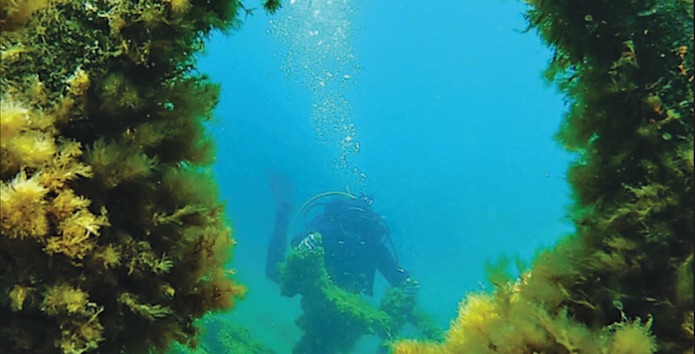
A War In The Waters Of Lake Michigan
By Beth Milligan | Sept. 24, 2018
More than a decade after the appearance of nuisance algae around Sleeping Bear Dunes National Lakeshore and throughout Lake Michigan — followed by mass bird die-offs that would be linked to the algae — researchers working at Good Harbor might have found a way to get rid of Cladophora algae, at least in localized areas.
Harvey Bootsma, an associate professor at the University of Wisconsin-Milwaukee’s School of Freshwater Sciences, led a team that scraped quagga mussels from rocks in a 40-square-meter area in the summer of 2016. As Patrick Sullivan writes in this week's Northern Express, sister publication of The Ticker, the work is part of a project to study Cladophora at Good Harbor with funding through the Great Lakes Restoration Initiative.
Two years later, not only have the mussels not returned, but the Cladophora algae is also missing in action, replaced with a diatom algae that better fits into the food chain and is not considered a nuisance. Chris Otto, a Sleeping Bear biologist, says the finding could be significant. "They noticed after a few years that where they scraped, the mussels weren’t recolonizing,” Otto says. “It’s very interesting.”
Melissa Duhaime, an assistant professor of ecology and evolutionary biology at the University of Michigan, started working on another piece of the puzzle last year — she set out with a group of students to attempt to understand how Cladophora algae can cause the conditions to produce the botulism bacteria. Last summer, she and 16 students took algae samples back to the lab to see what conditions were necessary to turn a harmless, common spore found almost everywhere into a deadly bacteria.
“We took Cladophora that was scraped off of the rocks and brought it back to the lab and subjected it to various conditions,” Duhaime says. Duhaime said she and her students are still working through the data, and they haven’t come to any conclusions, but she hopes her research will one day provide the tools needed to predict when conditions are ripe for an avian botulism outbreak so that, say, Sleeping Bear Dunes park rangers can clear algae from a particular beach once it’s been deemed vulnerable.
Read more about the war against nuisance algae in Lake Michigan and the discoveries giving scientists hope in this week's Northern Express cover story, "A War in the Waters of Lake Michigan." The Northern Express is available to read online, or pick up a free copy at one of nearly 700 spots in 14 counties across northern Michigan.
Comment






